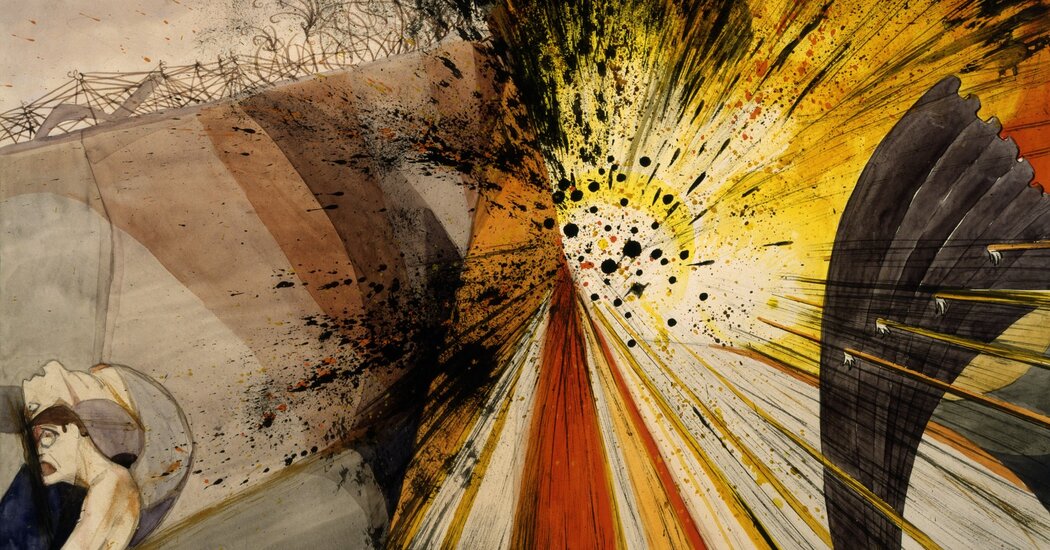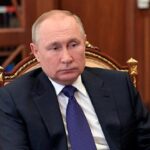
The usual date given for the start of World War II is Sept. 1, 1939, when Hitler invaded Poland after the signing of the Molotov-Ribbentrop Pact. But that was just one in a series of events that at the time could have seemed disconnected.
Among them: Japan’s invasion of Manchuria in 1931. Italy’s invasion of Abyssinia in 1935. The remilitarization of the Rhineland in 1936 and the Spanish Civil War, which started the same year. Anschluss with Austria and the Sudeten crisis of 1938. The Soviet invasion of Poland weeks after the German one and Germany’s western invasions the following year. Operation Barbarossa and Pearl Harbor in 1941.
The point is, World War II didn’t so much begin as it gathered, like water rising until it breaches a dam. We, too, have been living through years of rising waters, though it took Russia’s invasion of Ukraine for much of the world to notice.
Before the invasion, we had the Russian invasions of Georgia, Crimea and eastern Ukraine; the Russian carpet bombing of Aleppo; the use of exotic radioactive and chemical agents against Russian dissidents on British soil; Russian interference in U.S. elections and massive hacks of our computer networks; the murder of Boris Nemtsov and the blatant poisoning and imprisonment of Alexei Navalny.
Were any of these sovereignty violations, legal violations, treaty violations, war crimes and crimes against humanity met with a strong, united, punitive response that could have averted the next round of outrages? Did Western responses to other violations of global norms — Syria’s use of chemical weapons against civilians, Beijing’s eradication of Hong Kong’s autonomy, Iran’s war by proxy against its neighbors — give Vladimir Putin pause?
In short, did Putin have any reason to think, before Feb. 24, that he wouldn’t be able to get away with his invasion?
He didn’t. Contrary to the claim that Putin’s behavior is a result of Western provocation — like refusing to absolutely rule out eventual NATO membership for Ukraine — the West has mainly spent 22 years placating Putin through a long cycle of resets and wrist slaps. The devastation of Ukraine is the fruit of this appeasement.
The Biden administration now faces the question of whether it wants to bring this cycle to an end. The answer isn’t clear. Sanctions have hurt the Russian economy, arms shipments to Ukraine have helped to slow the Russian advance, and Russia’s brutality has unified NATO. This is to the president’s credit.
But the administration continues to operate under a series of potentially catastrophic illusions.
Sanctions may devastate Russia in the long term. But the immediate struggle in Ukraine is short term. Insofar as one of the main effects of sanctions has been to send tens of thousands of middle-class Russians into exile, they actually help Putin by weakening a potent base of political opposition. As for the oligarchs, they might have lost their yachts, but they’re not about to pick up their guns.
Arming Ukraine with Javelin and Stinger missiles has wounded and embarrassed the Russian military. Providing Kyiv with MIG-29 fighter jets and other potentially game-changing weapon systems could help turn the tide. Refusing to do so may only prolong Ukraine’s agony.
Frequent suggestions that Putin has already lost the war or that he can’t possibly win when Ukrainians are united in their hatred for him or that he’s looking for an offramp — and that we should be thinking up ingenious ways to provide him with one — may turn out to be right. But they are grossly premature. This war is only in its third week; it took the Nazis longer to conquer Poland. The ability to subdue a restive population is chiefly a function of the pain an occupier is willing to inflict. For a primer on that, look at what Putin did to Grozny in his first year in office.
Refusing to impose a no-fly zone in Ukraine may be justified because it exceeds the risks NATO countries are prepared to tolerate. But the idea that doing so could start World War III ignores history and telegraphs weakness. Americans squared off with Soviet pilots operating under Chinese or North Korean cover in the Korean War without blowing up the world. And our vocal aversion to confrontation is an invitation, not a deterrent, to Russian escalation.
There is now a serious risk that these illusions could collapse very suddenly. There’s little evidence so far that Putin is eager to cut his losses; on the contrary, to do so now — after incurring the economic price of sanctions but without achieving a clear victory — would jeopardize his grip on power.
Bottom line: Expect him to double down. If he uses chemical weapons, as Bashar al-Assad did, or deploys a battlefield nuclear weapon, in keeping with longstanding Russian military doctrine, does he lose more than he gains? The question answers itself. He wins swiftly. He terrifies the West. He consolidates power. He suffers consequences only marginally graver than the ones already inflicted. And his fellow travelers in Beijing, Tehran and Pyongyang take note.
How does the next world war begin? The same way the last one did.




